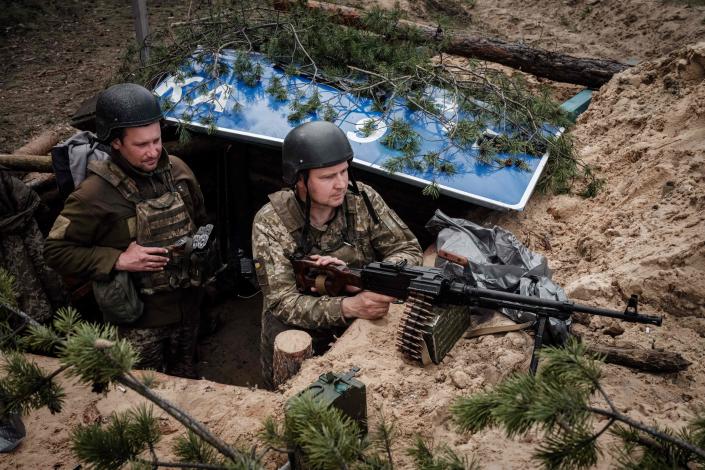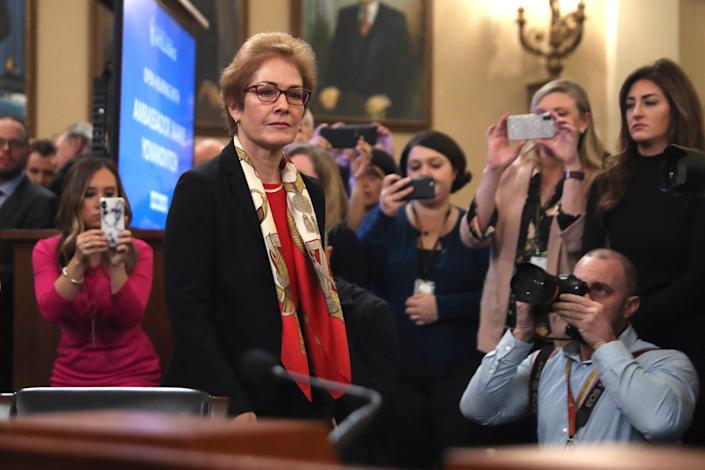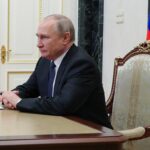
As the Russian invasion of Ukraine dominates world news, Marie Yovanovitch, the former U.S. ambassador to Ukraine, will speak today at the University of Tennessee at Knoxville about the crisis and the role of American diplomacy in world affairs.
In addition to serving as ambassador to Ukraine, Yovanovitch also was U.S. ambassador to Armenia and Kyrgyzstan, and filled roles for the State Department in Canada, Russia, Somalia and the United Kingdom.
Yovanovitch is the child of refugees from World War II-era Europe, a fluent Russian speaker and earned a bachelor’s degree in history and Russian studies from Princeton University and a master’s degree from the National Defense University.
Yovanovitch spoke exclusively with Knox News Executive Editor Joel Christopher in advance of her appearance as part of the Ashe Lecture Series of the Howard H. Baker Jr. Center for Public Policy. This Q&A has been lightly edited for length and clarity.
Joel Christopher: Thank you again for taking time to speak with me. We’re looking forward to having you here in Knoxville. Tell me, and this sounds like a simple question, but I think it’s an important one, why Americans should be concerned about what’s happening in Eastern Europe?
Marie Yovanovitch: So I know it seems very, very far away, and it is, but the world is a much smaller place than it used to be. What happens in a capital halfway around the world really does affect us here. I think during COVID we learned the words “supply chain,” if we hadn’t known them before, and what happens in one country can affect the economy of another or it can affect the supply of goods that we we rely on. The war that Russia chose to prosecute against Ukraine, I think we’re seeing the effects in terms of energy prices and if we haven’t seen it in grain prices and I think probably in a lot of other areas, as well. So that’s the most obvious way.
Another reason why this is so important, and I’m going to take you back to the time after World War II. World War II, of course, was a devastating war – there was so much death and destruction that the world’s countries came together and said we can’t have that happen again. So the U.S. worked with allies, but also with the Soviet Union, and we created institutions like the United Nations and we had agreements and we came up with the principles that guided how nations would work together.


So importantly, there was the sanctity of borders: You can’t just cross the border and take a hunk of a country and the principle of sovereignty, that countries get to decide how they rule themselves but they also get to decide their own foreign policy.
So there were a number of those principles and over time other organizations, not just on the political side, but on the security side, like NATO, and economic institutions, that helped us keep the world more secure and more prosperous and more free for the last 70-plus years.
More: Knoxville doctor who offered training in Ukrainian war zone: ‘I am planning to go back’
Closer look: Mysterious explosions, fires in Russia may signal war is moving beyond Ukraine
So when Russia, fast-forwarding to today, attacks a sovereign country and says that country has no right to exist, the people of that country are not their own people, they’re just “little Russians,” which is the word they use for the Ukrainians in the Russian language, that is an attack not just on Ukraine, but on the international system.
And if Russia succeeds in Ukraine – and I hope that with the help of the U.S. and the rest of the West that it won’t – but if Russia succeeds in Ukraine we can expect Russia to keep going.
And I say that for two reasons.
Just look what Russia has done over the last two decades. It attacked Georgia in 2008 and took two provinces, and at the time the West criticized Russia but did not deploy any sanctions. In 2014, Russia seized Crimea and annexed it illegally and then also start a war in the east, in the Donbas, which it has continued for the last eight years. And the U.S. criticized Russia, took a couple other steps like expelling it from the G-8, which is now the G-7, and deployed a number of sanctions, which I do actually think that those sanctions kept Russia from moving further into Ukraine at the time.
But I think Russia felt that it could absorb the pain of those sanctions and it kept Ukraine off-balance for eight years with a hot war in the middle of Europe in which several people died a week on the Ukrainian side. It didn’t make U.S. headlines but it was a real hot war in the middle of Europe. And now Russia is trying again and we saw them go for all of Ukraine. Now they’ve redirected themselves, rearmed, reorganized and repositioned in the Donbas.
Unless Ukraine succeeds, unless we deter Russia sufficiently, Russia will keep on going. You’ll recall right before the war started (Russian President Vladimir) Putin actually noted that it was not just Ukraine, it was other countries of the former Soviet Union that Putin was interested in bringing back into the fold of Mother Russia.
This is why it matters to Americans. If Russia and other autocracies are able to turn the world into a world where might makes right, it will be a much less stable and secure world. It will be less prosperous and it will be less free. And that will directly impact every American.
Christopher: There’s a consensus that the NATO deployment to the alliance’s nations that border the region is a clear warning that NATO is untouchable and that Putin would not risk that conflict. Are you confident that’s the case, that he won’t make some sort of grab at some part of NATO, even if it’s just a limited one, to test our resolve?
Yovanovitch: I think Putin has his hands full right now, for one thing.
Christopher: I should’ve framed that better – I’m thinking about in future years.


Yovanovitch: I think it depends on how we handle this crisis. I think one of the calculations that Putin made when he embarked upon this war is that he thought that the West was weak, that Biden would not be able to rally the allies to come together and push back on Russia and support Ukraine and that NATO had become an organization that wouldn’t stand up for itself and wouldn’t stand up for the allies that are front-line states with Russia and Belarus and Ukraine. I think that’s a big miscalculation on Putin’s part.
But we need to keep on being strong. We can’t lose focus. We need to keep on pushing back and making clear that NATO is inviolable and there will be a huge price to pay if Putin tries to attack.
At this point I would hope that Russia would not take a gamble on attacking NATO, but war is dangerous and mistakes happen. An errant missile could fly into NATO territory, and then what happens?
So the possibilities of mistakes or miscalculations are always present, and that is a real concern.
Christopher: You bring up a key point that the Western resolve has to match Russia’s. There is some segment of Americans who have a hesitancy, it seems, to cross certain lines with Russia. You’ve even heard people even say we provoked the invasion by our expansion of NATO and that we risk a wider European war if we respond too aggressively to Putin. What do you say to that perspective?
Yovanovitch: So I was in Russia in the early 1990s, I was there from ’93 to ’96, and then worked in the State Department on Russian affairs at the end of the decade. My recollection of that time is that we were working really closely with Russia following the dissolution of the Soviet Union in 1991 to bring Russia into the fold of the world community.
We expand the G-8 to include Russia even though Russia was not the eighth-largest economy in the world, but we wanted Russia to be part of the club of nations. And we provided a lot of assistance to Russia, provided a lot of high-level attention. The president of the United States, in my time, traveled to Russia once a year. That’s a lot of executive time from our leader. Cabinet members would meet with their counterparts. We had a very high-level and deep relationship with Russia throughout the 1990s.


NATO established the NATO-Russia Founding Act back in 1997 to establish what the relationship between NATO and Russia would be. There were regular meetings. Some people were even talking about Russia joining NATO.
So when I hear that this is all our fault somehow, that’s not the way I remember it, and I think there’s some revisionism going on.
The other thing I think we need to remember is that we, of course as Americans, look at everything through our lens. What did we do, what didn’t we do, and we are always the most important actor in our own story, understandably.
But other countries have agency. I mean it’s almost insulting to Russia to say it was all us and they’re just reacting – I don’t think so. Russia had agency, the Russian people had agency, and so did Russia’s leaders.
When Putin came in, he took Russia in a very, very different direction in 2001. And we are now seeing the results.
I can’t imagine if NATO had closed up shop in the 1990s or had said to the countries that wanted to join NATO, sorry, we’re not going to do that, that Russia is substantially a different country than it is now.
Putin has made very clear what his world view is. His legacy is that he wants to recreate the Russian Empire. I don’t think that has anything to do with NATO.
The last thing I would say is that several weeks ago we heard from the Ukrainians as they were negotiating that on the table was that Ukraine would be a non-nuclear neutral country, in other words not joining NATO. And Russia didn’t jump at that. Russia just continued the war with a little pause to regroup, and now it is attacking again.
Christopher: You spoke about some of the economic impact and Putin has said, in essence, the West will fold because we can’t bear the economic costs of opposing his aggression. Americans certainly react strongly and negatively to disruptions to their economic well-being. So he touched on some truth — you can see that at the gas pumps or the grocery store. What do you say to Americans who don’t care about a conflict in Eastern Europe that ignoring short-term pocketbook pain will pay far more important future dividends?
Yovanovitch: Sometimes that’s a hard argument to make, but it is an important argument to make, and I think that’s where leadership is important. That this is about our way of life and our future economy and our ability to conduct that economy in the way that we would like.
It’s not just for the president, it’s for all of our leaders, whether they are in Congress, whether they are in state government, to make that argument, to put it forward. That’s why we love having a free press. Newspapers such as yours can explain to people why this is important
Christopher: You’ve said in previous interviews and you said speaking with me that Putin is a bully, that if he isn’t met with strength he’s going to keep going. That escalation, I think, is what makes people fearful. He certainly has shown that he’s willing to cross lines. You can imagine scenarios where that escalation starts costing more and more for the Western alliance. If he tests that resolve, are you suggesting we have to go all in no matter what the circumstances are to stop him?
Yovanovitch: You made the point, but I’d just like to foot-stomp it. Putin is the one who is escalating. He is the one who invaded Georgia, who invaded Ukraine and 2014 and invaded Ukraine in 2022, and is raining terror on the Ukrainian people.
I mean, in no way can this be right.
I think the first thing to remember is that Putin is escalating. The second thing I say is that nobody wants a broader war. Nobody.
I think the Biden administration is navigating this very narrow lane of how do you deter Russia, support Ukraine, reinforce the allies and not somehow inadvertently do something that would broaden the war?
So there is risk in us doing what we are doing and pushing back on Putin. No question about it.
But there is also risk and I would also argue there is greater risk in allowing Putin to get away with it. That’s what we did in 2008, that’s what we did in 2014, and we cannot do that in 2022.
Christopher: Do you think we’re going to see wider provocations, or there is some sanity in what Russia is willing to do?
Yovanovitch: Fiona Hill, the great Russia expert, has said don’t think, ‘Oh, no, he wouldn’t ever.’ So I think that’s how I’ll answer that question.
Putin is testing not just Ukraine, he’s testing the West.
Christopher: You’ve said everyone has their own part to play in our democracy. How is supporting Ukraine right now in the best interests of the average American, and what should people do to support Ukraine?
Yovanovitch: Americans are the most generous people in the world. Support our government in continuing to provide assistance to the Ukrainian people, whether it’s security assistance, economic assistance, humanitarian assistance.
One of the things that we can do is keep on focusing on Ukraine because this is not something that’s going to be resolved in days and weeks and months. It’s probably going to be years. I don’t need to tell you this, our attention span can sometimes be short, we move on to the next crisis. This is one we need to keep on focusing.
This is not just a regional war, it is a war that has international, global implications. We need to see the right outcomes: the Ukrainians, democracy, freedom, needs to prevail, period, paragraph.
If you go
Ashe Lecture Series: Marie Yovanovitch
When: 5:30 to 6:30 p.m. Monday
Where: Student Union Pilot Company Ballroom, Room 272A, University of Tennessee campus, 1502 Cumberland Ave.
Parking: Guests may park in the Vol Hall Garage on White Avenue at no charge be requesting a parking voucher from staff at the event.
Cost: Free, and open to the public.
Joel Christopher is the editor of Knox News.
Twitter: @j_christo | Email: joel.christopher@knoxnews.com
Make our community, our society and our republic stronger by supporting robust local journalism. Subscribe online at knoxnews.com/subscribe.
This article originally appeared on Knoxville News Sentinel: Marie Yovanovitch: ‘Ukrainians, freedom need to prevail’




